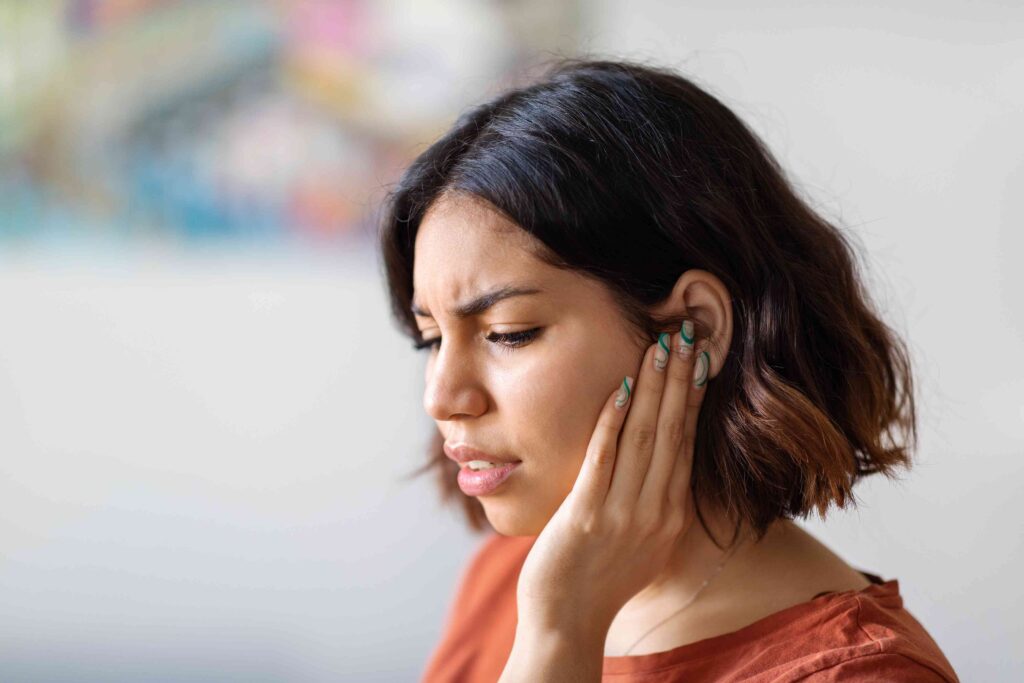Why is my ear numb? Have you ever wondered about this at times when you get the tingling feeling? Ear numbness and tingling is a perplexing and worrisome situation. Let us talk about the reasons behind it. Delve into the article to know why is my ear numb? Also, explore different ways to address it
What is Ear Numbness?
Ear numbness causes a tingling feeling or a loss of sensation. It is usually not a cause for serious concern. It is important to know about the potential reasons behind it for your overall well-being. This article will shed light on some prevalent scenarios where ear numbness may occur.
Causes of Numb Earlobe:
There are certain causes of numb earlobe which are:
1. Ear Numbness After sleeping:
If you wake up with a numb ear, it is due to your sleeping position. There maybe the unintentional pressure on the ear during sleep that can restrict blood flow. It results in a temporary tingling or numb sensation. Adjust your sleeping position or use a supportive pillow to resolve this issue.
2. Dental Procedures and Ear Numbness:
Visits to the dentist can lead to ear numbness. The dental procedures involve anesthetics that affect nearby nerves to cause temporary numbness. This sensation typically subsides but if it persists, consult your dentist.
3. Ear Numbness and Infections:
Ear infections such as otitis media or swimmer’s ear can contribute to ear numbness. Inflammation and fluid buildup in the ear can result in a loss of sensation. It is often accompanied by pain, pressure, or reduced hearing. Seek timely medical attention and appropriate treatment in such cases.
4. Circulation Issues and Numb Ears:
Poor circulation in certain conditions like diabetes or cardiovascular diseases reduces blood flow to the ear and leads to numbness in the ear. Regular numbness may warrant consultation with a healthcare professional for a thorough evaluation.
Also read: Why Do I Hear Crackling in My Ear?
Numb Ear Symptoms:
During the numb year apart from numbness, individuals may experience symptoms such as:
- Tingling: Individuals facing numbness can experience a tingling sensation in the numb ear, adding to the overall discomfort.
- Dizziness: Ear numbness and dizziness can be felt together, contributing to a sense of imbalance or unsteadiness.
- Reduced Hearing: Some may notice a decrease in their hearing capabilities along with numbness in the era, indicating a potential connection between the two sensations.
Recognizing these additional signs is crucial when seeking medical advice, as they can offer valuable insights into the underlying cause of the numbness.
When to Seek Medical Attention:
The ear numbness is often harmless but certain scenarios like persistent numbness, severe pain, or sudden onset need a timely medical consultation. It is crucial to seek professional guidance as soon as possible in such crucial conditions to keep your ear health.
Ear Numbness Diagnosis:
Medical professionals use various diagnostic methods to treat numb earlobes, including physical examinations, imaging, and blood tests, to identify the underlying cause of ear numbness.
Treatment Options:
Treatment for ear numbness depends on the root cause. General remedies may also help in curing the symptoms which include:
- Addressing the Root Cause: Determine the specific cause of ear numbness through medical evaluation to tailor treatment accordingly.
- Change Your Sleeping Positions: Adjust sleeping positions to relieve pressure on the ear, potentially alleviating numbness.
- Warm Compresses: Apply warm compresses to the affected ear to improve blood circulation and reduce sensations of numbness.
- Maintain Good Ear Hygiene: Maintain cleanliness in the ear to prevent infections and potential causes of numbness.
- Exercise Regularly: Engage in regular physical exercise to enhance overall circulation and promote ear health.
- Consultation for Underlying Health Conditions: Seek medical advice for underlying health conditions, such as diabetes or cardiovascular issues, which may contribute to ear numbness.
Preventing Ear Numbness:
There are various preventive measures including:
- Adjust Sleeping Positions: Optimize your sleeping positions to minimize pressure on the ears and reduce the likelihood of numbness.
- Maintain Good Ear Hygiene: Regularly clean your ears to prevent infections and reduce the risk of ear numbness.
- Address Underlying Health Conditions: Consult with healthcare professionals to identify and address any underlying health issues that may lead to ear numbness.
Lifestyle and Home Remedies:
Adapt the changes in your lifestyle and home remedies that may help alleviate ear numbness, such as maintaining cleanliness and monitoring changes in your ear over time.
- Maintain Cleanliness: Ensure proper hygiene in your daily routine to prevent potential causes of ear numbness, such as infections or wax buildup.
- Monitor Changes Over Time: Regularly observe and monitor changes in the ear to track improvements or worsening of symptoms.
- Explore Home Remedies: Consider home remedies, such as warm oil drops or saline solutions, under professional guidance to alleviate ear numbness.
- Digital Otoscope for Enhanced Self-Awareness: Use Digital Otoscope which is convenient at-home ear inspections empower individuals to monitor changes, identify abnormalities, and maintain proactive ear care.
Remember, these suggestions are general, and it’s essential to consult with healthcare professionals for personalized advice based on individual circumstances.
Conclusion:
Ear numbness is a temporary and benign condition. It is important to understand its causes for overall well-being. Always consult your doctor for professional medical advice. They can give you a proper diagnosis and personalized treatment recommendations. Also, consider the benefits of at-home ear inspections using a digital otoscope for enhanced self-awareness and proactive ear care.
Medical Disclaimer: We only provide information for educational purposes. Do not consider it medical advice for you. In case of need, consult the healthcare professional for proper diagnosis and treatment.
Disclaimer: The content on Wellness Derive is for informational purposes only and not a substitute for professional medical advice, diagnosis, or treatment. Always consult a healthcare provider for medical concerns.



